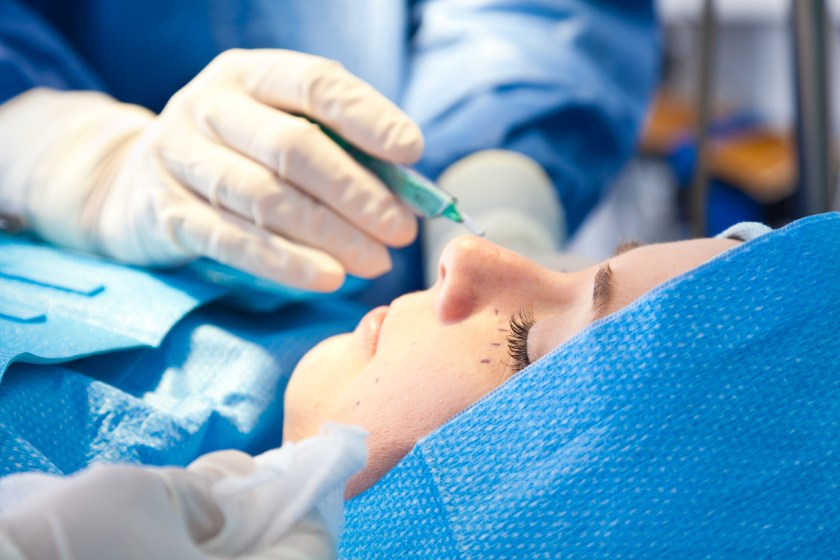This story was originally published on June 16, and has since been updated with commentary from ASAPS.
The Australasian College of Cosmetic Surgery (ACCS) are lobbying the Australian government to bring clarity and reform for all medical practitioners providing cosmetic surgery.
Approximately 500,000 Australians go under the knife each year contributing to an industry that’s worth more than $1billion per annum. The current concern surrounds who should and should not be performing cosmetic surgery, something that a lack of industry regulations makes unclear.
While Specialist Plastic Surgeons are formally accredited, it doesn’t automatically ensure a surgeon has specific experience in aesthetic cosmetic surgeries. On the other hand, any medical practitioner can call themselves a Cosmetic Surgeon.
The ACCS President, Dr Patrick Tansley, said there are three types of medical practitioners calling themselves ‘cosmetic surgeons’, leading to confusion among patients and regulators.
“Any medical practitioner can currently call themselves a cosmetic surgeon, including general practitioners, plastic surgeons and Fellows of the Australasian College of Cosmetic Surgery.
“Patients have no way of knowing whether their surgeon is properly qualified and has undergone specific training in cosmetic surgery.”
The Australian Medical Council (AMC), an independent national standards body for medical education and training, does not currently accredit or assess the training or competence in cosmetic surgery of any medical practitioner in Australia. This includes both specialists in plastic and reconstructive surgery, the latter of which have been found by the AMC to ‘have a gap in this area of practice’.
Cosmetic surgeries may be being performed by untrained surgeons.
A 2017 study by the AMC found that approximately 500 surgeons who may, or may not, have any specific cosmetic surgical training whatsoever are currently performing cosmetic surgeries.
The ACCS want the State and Federal Health Ministers, COAG Health Council, regulators and other relevant stakeholders, to develop a competency-based National Accreditation Standard in cosmetic surgery to provide better and safer outcomes for patients.
“We are calling on the Australian Federal and State governments to provide a single accreditation process so that Australian patients can be assured their surgeon is properly trained in cosmetic surgery,” Dr Tansley said.
“This would ensure that all doctors, including plastic surgeons, who call themselves cosmetic or aesthetic plastic surgeons would need to have achieved an independently assessed benchmark of relevant training, qualifications and experience specifically in cosmetic surgery.

“The ACCS has also proposed an AHPRA-Register of all medical practitioners performing cosmetic surgery who have met and maintain the standard. Only those on it would be able to use the title ‘cosmetic surgeon’ or ‘cosmetic or aesthetic plastic surgeon.’
“This would enable consumers to easily identify practitioners who are trained, accredited and safe to practice cosmetic surgery from those who are not.”
Controversy surrounds the issue as many plastic surgeons are choosing not to endorse the push for regulation in an effort to protect their skillset while limiting those who can perform cosmetic surgeries to accredited plastic surgeons only.
The ACCS likens this resistance to ‘cartel behaviour’.
“This is the worst type of cartel behaviour that puts their own incomes ahead of the safety of patients. We must protect Australian consumers, not the plastic surgeons $2m club.”
UPDATE, 21/6/21:
We reached out to ASAPS for commentary and have received the following from ASAPS President Dr Rob Sheen:
“ASAPS is not proposing a change to the industry […] The current issue lies where there is a group of practitioners who have not undergone training of sufficient quality, that allows them to register with AHPRA as specialists.
Some of these practitioners are masquerading as specialists, by using the fabricated title of ‘Cosmetic Surgeon’. By doing so, they are able to attract unsuspecting patients who believe, and have no reason to question, that these practitioners are registered specialists in surgery. The fact is that many are registered as general practitioners.
ASAPS strongly believes all practitioners need to tell their patients the truth about their registration status. Only by understanding the true registration status of their practitioner can patients make more informed decisions when considering surgery. As it stands, many patients are unaware of this issue, and are being deceived into believing that their practitioner is a registered specialist.
There is no evidence that plastic surgeons are trying to “protect their turf”. Patient safety is always the most important consideration. In fact, cosmetic procedures are frequently performed by plastic surgeons, ophthalmologists, and otolaryngologists. All of these groups are registered as specialists by AHPRA. They have all successfully completed AMC accredited training programs. When these practitioners use their AHPRA title, they are being truthful and transparent to their patients that they are registered specialists. However, when a practitioner uses the title ‘Cosmetic Surgeon’, they falsely represent themselves as specialists in the field of cosmetic surgery.”
Dr Sheen continued to pose the questions whether the ACCS ever applied for AMC accreditation as a specialist training organisation, and whether ACCS training enables its graduates to qualify for specialist registration by AHPRA.
It’s clear there are more important discussions to be had, and we will continue to publish any updates on this matter.
DID YOU KNOW
There are 5 ways you can catch up with SPA+CLINIC?
- Our quarterly print magazine, delivered to your door. Subscribe here.
- Our website, which is updated daily with its own completely unique content and breaking news.
- Our weekly newsletter – free to your inbox! Subscribe here.
- Our digital magazine – click here to view previous issues.
- Our social media – see daily updates on our Instagram, Facebook & Linkedin





